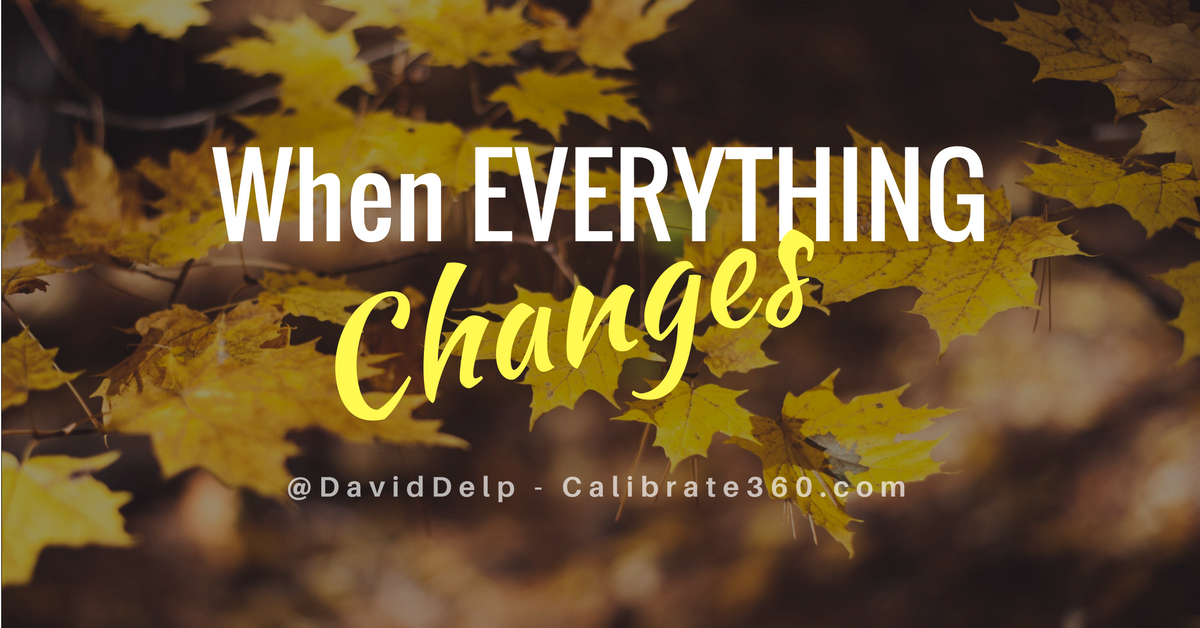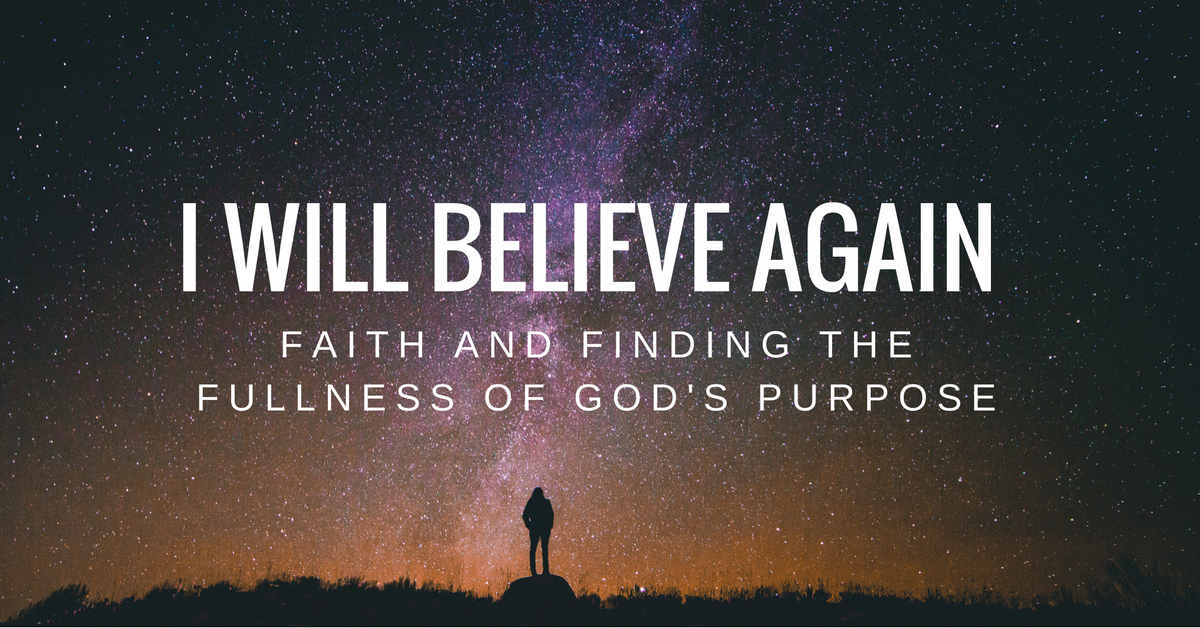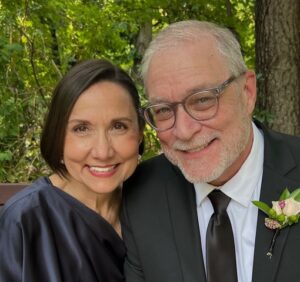
by David Delp | Nov 17, 2016 | Grief & Disappointment, Uncategorized
Standing in the hallway of St. Vincent’s Hospital exactly 4 years ago, I thought about many of the things in our lives that were about to change. I did not anticipate that everything would change.
That first night I went to bed alone trying to wrap my head around what had just happened. I woke up several times in the night. I got up long before the sun came up and looked out the window hoping daylight would take some of the darkness from my soul. (more…)
by David Delp | Nov 9, 2016 | Grief & Disappointment, Joyful Living, Uncategorized
You can’t live joyfully if you blame yourself, and others for that matter, for everything bad that’s happened. Stuff happens and it is incumbent upon us to live beyond the tough stuff.

When Joyce, my wife died I blamed myself at first. I think all of us who have lost someone in an untimely way goes through this to some extent. “What if…?” What if I’d not taken the time to take a shower? What if I hadn’t dropped my shaver and then taken the time to clean up the shavings that fell all over the floor and down into the HVAC vent that morning? What if I’d not slept in the recliner that night, thinking she would rest better? What if I’d called for help sooner?
What if I’d been more forceful with the ER doctor the day before? Maybe I believed him because I didn’t want to insist upon it and pay the co-pay for a needless third MRI, just because she had a run-of-the-mill headache.
What if I had loved God more? What if had a more excellent faith? What if I had prayed more, or better, or differently? What If I’d said different words? What if I’d taken more spiritual authority? What if I had not stolen that little plastic 47 cent figure from G.C. Murphy when I was 13 years old on a dare? What if God had loved me more? What if I had been worthy for God to have loved me more?
Yeah, some of you know the routine. You’ve stood and looked in your bathroom mirror and cursed yourself and called yourself names, because had you been smarter, had you been better, had you been…
What if…?
Its odd how we make things about ourselves. Its actually a little arrogant to assign ourselves a central role in so many of the things that happen in the world.
I’ve learned a lot about myself over the past 4 years. I was given the gift of a looking glass into which I could peer and really see myself. At first I did not like what I saw. This preacher of the love of Jesus for 30+ years, the whole “no condemnation” part — over and over again. Yep, I was that guy. Gradually I started seeing another image in that mirror looking back at me. The transforming image wasn’t a despicable man responsible for losing the most precious gift I had to that point been given; rather, I began to see a familiar face somehow miraculously merging with my own. I began to see Jesus in my face.
I began to identify just a wee little bit with his sufferings. I began to identify just a wee little bit with his compassion and humility. I began to identify, in an infinitesimally small way with the man-Jesus who hung torturously on a cross and looked heavenward into the face of his once dotingly adoring heavenly Father saying, “My God….Why have You forsaken me.
I could not identify with the immensity of His pain, but I could identify with his massive “why.” Our “what ifs” are rooted in our “whys”.
Here are a few related leadership principles that will help you live joyfully and better lead those you love:
Everything Is Not Your Fault
You can’t live joyfully if you blame yourself (and others for that matter, which is another post) for everything bad that’s happened. Stuff happens and it is incumbent upon us to live beyond the tough stuff. Admittedly, some things ARE our faults, but the majority of the things for which we blame ourselves are not our fault, and fault isn’t even the main point if we want to heal and move into our purpose.
[shareable text=”You can’t live joyfully if you blame yourself for every bad thing that happens.”]You can’t live joyfully if you blame yourself for every bad thing that happens.[/shareable]
My dad taught me to take responsibility for my actions. own up to my mistakes. Admit you were wrong and move on as best as reality will allow. But as godly leaders, we often take internal responsibility for things that were not ours to control. I could not alter the events of November 17, 2012 (the day of my wife’s passing). They were written in a book before the foundation of the world. That does not mean that I don’t try, it is simply an acknowledgment that I cannot control everything.
You see, you can’t control the actions and decisions of others, nor can you rewrite the consequences of the things you cannot control.
Don’t Second Guess the Past
“What if” is a game that must not be played in reverse. Learn to learn from the past. Understand the future in the context of the past. Be stronger, better, and equipped from the things you’ve learned and experienced, but be very cautious with the creation of alternate scenarios, because alternate scenarios lead to alternate realities. We live where we live, reality is reality.
Instead play “what if” forward and positively. What if today I love my wife like it is the last day I will have her with me? What if I apply myself diligently to the revelation I’ve received? What if I live faithfully and trust God’s grace? What if…? What might happen if…? and then live it.
Live in Partnership with God
Outcomes emerge from our obedience to God’s directives. I am of the conviction that things and people are only eternally transformed through a God-revelation. I cannot expect to bear great fruit outside my gift, and neither can I position myself to effectiveness contingent upon my earning it.
You can’t create something transformational if you think yourself unworthy of God’s grace. You can’t lead with A profound spiritual horsepower until you’ve been beaten up, probably several times, and learned that you just cannot make it through tough stuff unless you have some help. This fixes both your reliance and sufficiency on God.
I’m going to do my best, but I really can’t change much. I for sure cannot change the things that are behind. I can only learn from them. I can only use them for a context to understand the things to come.
If I can’t change much in my past, then why am I obtuse enough to think I can really orchestrate my future. Oh yeah, I will be disciplined, I will be determined, I will not quit, I will hear the heartbeat of the Father and I will doggedly and obediently pursue his plan, but I play just one instrument and my Father is the conductor. I have to trust that he will give me the right part, the right music, and the will to be tenaciously obedient.
Nothing I did or did not do that day affected the outcome. Sometimes I wish it had so I would understand better. I was along for the ride on a very bad day, but that ride is still taking me to … I’m not sure where, but I choose to position myself to live joyfully, and trust that the destination is a very, very good place.
by David Delp | Oct 4, 2016 | Grief & Disappointment, Joyful Living, Leadership, Uncategorized
 How do you re-engage a joyful life when joy has been stripped away? We are committed to the pursuit of a joyful life. Boldness is actually required for joyful living. We will boldly pursue joy!
How do you re-engage a joyful life when joy has been stripped away? We are committed to the pursuit of a joyful life. Boldness is actually required for joyful living. We will boldly pursue joy!
People mean well. They want to make us aware of how things should be. They want to help us clarify our obligations to God, nation, church, and family. I’ve found yet another comforting key to living a joyful life; I scroll past political commentary on my social media feeds. I unfollow the most vitriolic, don’t have time for it. I limit my news consumption to a few minutes a day from measured sources. If I want to dive deep I can, but I’m not going to let FOX or CNN roll while I eat my evening cereal. I will be informed, I will not overdose on opinionated commentary.
You see, I already know what I believe. I do. My thinking is well developed. I’ve chosen a path for my life. I research when I am confused, but I stand when I have certainty. I know where I’m going. I know what I’m to do with my life. Opinions considered, I want to just get on with my mission.
When I listen to rants I usually get enraged about something over which I have no control. I will vote. I will state my beliefs. I will chart an unwavering course. I will live a joyful life which comes from focusing on what’s important and giving less focus to things not central to my personal mission.
[shareable]Boldness generates joy in a strange sort of way.[/shareable]
… The boldness to defy the conventional in favor of the transformational
Living our lives in a cage of convention puts our focus on parameters instead of simple joys. Yep, anal people like me have a harder time being joyful. Joy comes through transformation into the newness of abundant living. Not every “i” is yours to dot, not every “t” is yours to cross. If you spend your life dotting and crossing every incomplete “i” and “t” you come across it will strip your joy.
… The boldness to defy routine for the extraordinary
Habit and routine are keys to success… They are… But taken to an extreme they strip simple joy. Do something different. Find new places. Discover the joy of a new adventure. To reach for the extraordinary we must reboot our routine.
… The boldness to defy the mundane for the next miraculous
When we were children we marveled at the veins in a leaf and the fuzz on a caterpillar. Have you lost your wonder? Have you come to see the miraculous gift of life as something to be endured rather than enjoyed? We’ve been there! Don’t be so focused on where you are going that you fail to live right now.
… The boldness to defy hypocrisy for reality
I am an unapologetic Christ-follower. Jesus loved hypocrites, but he hated their hypocrisy. Condemning others for things we ourselves practice, though perhaps in a slightly different form, is hypocrisy. If you want to live a joyful life, cut off the people who strain a knat and swallow a camel. See, “they” want you to adhere to standards they cannot even keep. If you try–no joy for you!
… The boldness to defy deception with truth
The truth will set you free. Freedom brings joy. We lie to ourselves about ourselves too often. God thinks I’m awesome, he does (another #writingthought)! I’ve always seen myself as less than I was. Arrogance and humility aside, most of us beat ourselves up when actually, most of us are pretty awesome people. I can never be joyful unless I like me.
We are committed to living a joyful life. We will joyfully embrace transformation. We will pursue the extraordinary. We will rediscover a wonder for the miraculous. We’ll ignore hypocrisy and the agendas of the frightened. We will live with the largess of God. We will joyfully embrace who we are…because God does.
by David Delp | Sep 29, 2016 | Spiritual Life, Uncategorized

When you see obstacles, odds, and enemies larger than your own resources — do not be afraid.
I am at a men’s prayer summit this week. I decided I would do a post every morning related to what I’m “hearing” and “seeing.” I am a recovering perfectionist, so shooting from the hip is hard for me, I don’t like to push “publish” until I’ve completely over thought a post, but I am intentionally not over thinking this week… because I need to loosen up a bit and let who I really am show through. This is the final installment of my “Thoughts from the Summit” series.
God is laying out new paths in my life. Dreams and visions that have emerged for decades are finding legs. Every dream and every vision comes complete with its own set of obstacles. We have to wrestle through the obstacles. Whether you are leading a church, a business, or building out new platforms in your life, you will, of course, face obstacles and resource challenges.
In The Book of Deuteronomy, chapter 20, God gives directives for going to war. In the pursuit of our calling, our dreams, and the fulfillment of God’s vision in our lives we have to cross the boundaries of our comfort zones and move into conflict.
Deuteronomy 20:1 says, “When you go out to war against your enemies, and see horses and chariots and an army larger than your own, you shall not be afraid of them, for the Lord your God is with you, who brought you up out of the land of Egypt” (ESV).
How can we position ourselves to boldly pursue the things in our hearts? Here are four things declarations necessary to go boldly into the battle to contend for the vision.
Rely Upon God’s Resource
Look around. See the odds against you. Just look at all the other people who have gone before you who failed and the remnants of their foolish attempts lie scattered on the ground. Faith says that if my directive is from God, God will provide. If the battle is the Lord’s, then we trust him to intervene in the battle. When my resource is inadequate, then it does not really matter how inadequate my resource is… too little is too little no matter how it scales. When I get into a God-zone, then either I trust or I don’t, there really is no in between.
I’ve always wanted to live my life in pursuit of God’s plan for my life in such a way that I was reliant upon him. To pursue God-dreams so big that if God did not resource and intervene, I would utterly fail. I am getting dangerously close to such a posture, and it is kind of scary. It’s scary because I have to give up control. It’s scary because my resource is not enough. It’s scary because I have to trust, trust that God is sufficient.
God is With You
The difficult implication of Deuteronomy 20 is that God is with “you” and not “them.” Be careful with this. When I frame this in the context of God’s calling on my life, if God has called me to a task, if he has birthed a vision within me, then his purposes and activity in my life supersedes the strength of the obstacles. Walking through the grief process the greatest comfort to me was, “Though I walk through the valley of the shadow of death, he is WITH me.” I learned in a new way that God was with me. The word of God to his people is, “When you see obstacles 10x bigger than you are, don’t be afraid because I am with you.”
Stand Against the Obstacles
A house divided against itself cannot stand. God cannot be for the thing he put in you and for the things that tear you down. Think about it. Sometimes we pursue our own imaginations, and it is dangerous to assume our own imagination is a directive from God. We have to work out the difference. Sometimes all we can do is move forward with a sincere heart and proper motivations. Time and God’s activity will bring some adjustments.
There are always obstacles, and I cannot let them scare me away from the things I sincerely believe I am to pursue.
God Has Proven Himself in the Past
When we look back we see good things and bad things. I’ve been through the times of looking back and just getting angry that God did not intervene differently, but I also look back and see God working on my behalf. David, the shepherd boy, had the courage to go against Goliath because he had been victorious in his skirmishes with bears and lions while protecting the sheep. David’s reasoning was that God helped him with the bears and the lions, he would help also him with the giants. If God helped us before he will help us again.
Contending for a vision is sometimes like going to battle. We have to wrestle against ever-present obstacles. Usually, the world isn’t out to get us… it just feels that way sometimes. Stepping into our desired future is always hard because it necessitates leaving our comfort zone. That, in and of itself, is a battle.
I will boldly content for the things in my heart… because I believe they came from the heart of the Father.
(NOTE: This post is the last in the series of “Thoughts from the Summit.” I took on the challenge of posting “from the hip” things that were stirring in my heart this week.)
by David Delp | Sep 26, 2016 | Grief & Disappointment, Spiritual Life, Uncategorized

One of the keys to loving the “twists” in life is embracing their divine nature. Besides, most of the good things in life come from the “twists” in life’s road.
Deo Volente,” it is a Latin phrase meaning “God willing.” A century ago, it was common to include the initials D.V. at the bottom of a letter or invitation. The initials qualified the contents of the letter, indicating plans based upon and subservient to God’s will (James 4).
My Granny was a wiry old woman. In the middle of the Great Depression, at the age of 35, with no means of supporting herself and her four children, she buried my granddad who died in an accident as a West Virginia coal miner. They were married 17 years. She never remarried, probably never even thought about it.
To my recollection, Granny never stated her future intention, be it about going to the grocery store, sweeping the floor, or preparing a meal, without adding the phrase, “Lord willing I am going to….” “Lord willing, I’m going to make a banana pudding.” I was always certain the banana pudding was God’s will! As an ignorant theology student in college, I sometimes said to her, “Granny, it is not necessary to add ‘Lord willing’ to every statement, God doesn’t care if you make a pudding.” She was never deterred.
Now I get it.
Walking through life’s difficulties, there are days I’d like to chat with Granny. I would like to hear from her in my present context of understanding. I’d like to know what God taught her as a young mother, alone in the middle of the Great Depression. Granny somehow learned to resign herself to the will of her God and, with all of her heart and sincerity, to faithfully trust. And it was proven, her trust was not misplaced.
Now, my friends sometimes chide me for saying, “Lord willing.” They sometimes jokingly add, “and if the creek don’t rise.” I don’t care so much about rising creeks, but I do want to acknowledge God’s rightful prerogative to intervene in my plans. Sometimes I add “DV” to the bottom of communications. Deo Volente, if God wills it.
Here are five thoughts about embracing the will of God:
Boldly Pursue Life
Don’t just sit around and wait for the “will of God” to hit you in the face. Use the gifts, insights, and discernment God has given you to boldly pursue the divine future you see. Sincerely acknowledge “Deo Volente,” because reality often ends up different than imagined, but have confidence that God’s progression will bring you to a good place. Otherwise our inactivity bring paralysis.
Allow for Variances
When things turn out contrary to the way you imagined, embrace “Deo Volente”. When things turn out contrary to your plans, if I have not allowed for variances, if I have not allowed for “Deo Volente,” you will get body-slammed. Denial is a normal part of grief, and it takes many forms, but we eventually realize denial does not change reality.
Embrace the Twists
When you lay plans, acknowledge “Deo Volente.” Oddly enough, when you acknowledge such from the outset, it is easier to recognize and joyfully embrace twists in your road. The greatest joys come from the “twists.” Twists may be devastating, but more often, they are incredible blessings.
[shareable]The greatest joys come from the ‘twists’ in our journey. Twists may be devastating, but more often, they are incredible blessings.[/shareable]
Acknowledge Present Reality
Why do some Christians think it a lack of faith to acknowledge present reality? God is bigger than our reality, he can change present reality, but reality is still reality. Responsibly face the things that are. Faith speaks into existence things that are not. Speak to the desired reality while acknowledging present reality. Prayer is seeking God’s will on earth as it is in heaven (Matthew 6).
[shareable]God is bigger than our reality, he can change present reality, but reality is still reality.[/shareable]
Joyfully Desire God’s Will
I say, “Lord willing,” “Deo Volente,” “DV,” because if I make a stupid or uninformed plan, I WANT God to intervene and help me discover a better path. It takes trust, self-denial, and a bit of “crucifixion,” but His plan is always better in the end. I want God’s path, even when it looks like a path I’d rather not take.
Such is the faith taught me by a wiry little West Virginia woman who weighed less than 100 pounds, always wore her hair in a tight bun on the back of her head, who navigated losses and disappointments that I have only begun to understand.
Deo Volente. God willing.
by David Delp | Sep 12, 2016 | Spiritual Life, Uncategorized
 Donna and I have both had to walk through a rebuilding of our faith. Our former definition of faith was something like, “believing that God will do anything you direct him to do because you are his favorite person.” Ummm… not exactly… The Scriptures are always quite clear that we are to be seekers of God’s will and not ours—because His plan is better, even when it looks like his plan stinks!
Donna and I have both had to walk through a rebuilding of our faith. Our former definition of faith was something like, “believing that God will do anything you direct him to do because you are his favorite person.” Ummm… not exactly… The Scriptures are always quite clear that we are to be seekers of God’s will and not ours—because His plan is better, even when it looks like his plan stinks!
This isn’t a theological discussion, it is about our lives and the way we’ve grown to be at peace with something that we cannot fully understand. God is who he is, he is “I AM.” We, as the creation and not the creator, do not have the prerogative to create God in our own image, but it is ours to open our lives up to him that we may know him, as much as God is knowable, for who he is.
Some believe faith is based solely on the statement of scripture. Our experiences must be discounted in favor of scripture. If scripture says God performs miracles, then he does whether or not we ever actually see a miracle.
Others say faith is experientially based. While honoring scripture as our “all sufficient rule for faith and conduct,” our experience proves God’s miraculous ability. A person with a testimony is more influential than someone with merely an intellectual argument. A weakness of experiential thinking comes when our experiences do not jibe with our belief or knowledge. When we believe that God can perform a miracle, say… a healing, and he does not, then our experience informs us that God does not perform miracles.
Some others say that God performs miracles according to our faith, and when we ask without result the “fault” lies with us because we were not faithful enough, prayerful enough, or good enough. We didn’t pray the right way.
Yep, Donna and I have waded through all of that stuff. We’ve been on a journey of rediscovery and trust. As a result, our faith has grown to previously unknown levels. Now, rather than basing my faith on my own strength, ability, intellect, knowledge, understanding, wisdom, education, etc., my faith is based upon a simple trust in God, as it should have been all along.
I have come to think of faith on four practical levels.
Level One Faith: A Belief that God CAN Do the Miraculous
Both Donna and I grappled with faith questions as we navigated the disappointment of grief. I never deeply doubted that God could do anything, but I wasn’t sure he WOULD do the miraculous. A level one faith questions whether or not God is active on this earth. We observe pain and suffering in this world and we pose temporal explanations for the seemingly miraculous. We believe God can, but will he?
Level Two Faith: A Belief that God DOES do the Miraculous
The testimony of Scripture, the testimony of people we trust, and our own personal observations and recollections reinforce that God does do mighty things. At level two, a doubt remains as to whether or not God will move on our behalf, because we may not deserve it, but God does do miraculous things.
Level Three Faith: A Belief that God will do the Miraculous In and For Me
This has been a journey of trust. I do not know why God chooses to release his power to miraculously heal a dying person in one instance and withholds the power in another instance. I can think of a hundred reasons why he might, but I choose to make it simple—I choose to walk faithfully with God and trust him. A level three faith brings me to the place of daring to believe that not only can God do great things, and not only does he do great things, but he does great things in my life. We will not understand everything, but God is motivated by love toward us.
This third level of faith requires trust. What I see or don’t see may trouble me, but when I place my trust in God, my perspectives change and my faith stabilizes.
Level Four Faith: A Belief that God will do the Miraculous Through Me
God and I are still working on the perfecting of a level four faith in me. A level four faith is NOT about seeking the miraculous, it is about being the miraculous. It is about being an instrument in God’s hands and participating in the simple yet miraculous transformation in the world around us.
Level four faith is living in the belief that God accepts me; he actually likes me, even when I do not. He is gracious and merciful. Discovery of a level four faith opens huge doors of opportunity, because it is only when I believe, truly believe that not only will God do great things, he calls us to participate in his divine nature (2 Peter 1:4). A level four faith requires obedient trust in God.
Donna and I want you to know that when you are shaken you don’t have to be destroyed. God really does work through the tough stuff to prove himself faithful. When you’re feeling beat up, challenged, hurt, or disillusioned, dare to believe that when we trust and grow in our faith we discover that…
… God CAN do mighty things,
… God DOES do mighty things,
… God will do mighty things in your life,
… and God will do mighty things through your life so you can realize his purpose and plan for your life.



 How do you re-engage a joyful life when joy has been stripped away? We are committed to the pursuit of a joyful life. Boldness is actually required for joyful living. We will boldly pursue joy!
How do you re-engage a joyful life when joy has been stripped away? We are committed to the pursuit of a joyful life. Boldness is actually required for joyful living. We will boldly pursue joy!

 Donna and I have both had to walk through a rebuilding of our faith. Our former definition of faith was something like, “believing that God will do anything you direct him to do because you are his favorite person.” Ummm… not exactly… The Scriptures are always quite clear that we are to be seekers of God’s will and not ours—because His plan is better, even when it looks like his plan stinks!
Donna and I have both had to walk through a rebuilding of our faith. Our former definition of faith was something like, “believing that God will do anything you direct him to do because you are his favorite person.” Ummm… not exactly… The Scriptures are always quite clear that we are to be seekers of God’s will and not ours—because His plan is better, even when it looks like his plan stinks!